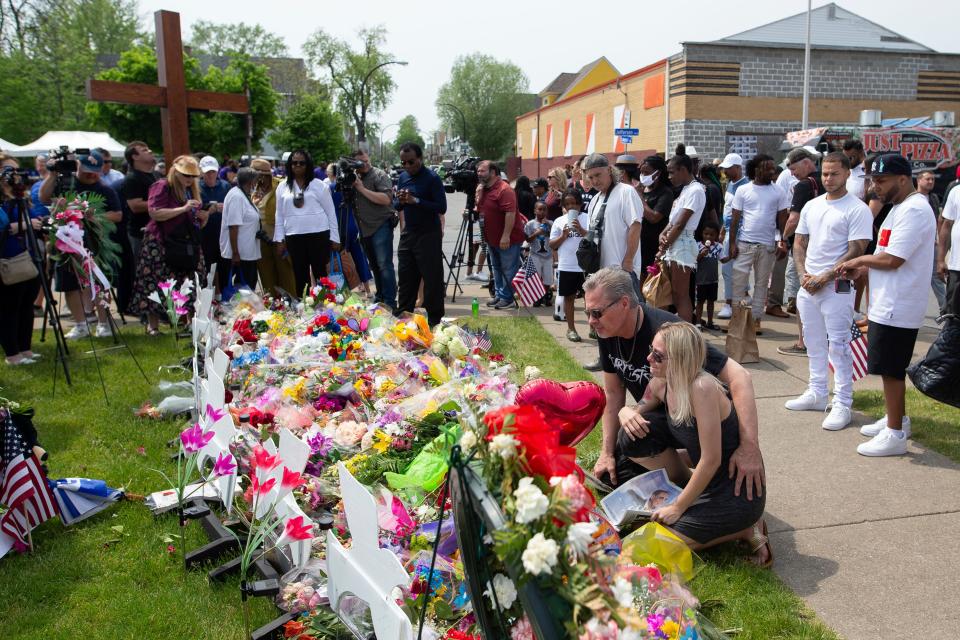Stronger gun laws needed to prevent mass shootings
The aftermath of the high-fatality mass shooting in Buffalo leaves little reason for optimism that the steady flow of these horrors will recede in the foreseeable future. The immediate response after the shooting followed a familiar script, with officials offering “thoughts and prayers” and bromides about the closeness and resilience of the community.
The truth is that communities are devastated and residents are traumatized. The trauma extends beyond the site of the shooting, as members of the group attacked, whether a racial or religious group, or those in a vulnerable setting (students), will be especially affected.
A 2018 American Psychological Association survey found that mass shootings constitute the greatest source of stress for 15- to 21-year-olds. More broadly, a 2019 Harris poll found that a third of Americans avoided certain places or events due to their fear of mass shootings.

In their coverage, the mainstream media tend to rely on briefings provided by law enforcement rather than researchers familiar with the subject. The focus is on the suspect, his specific motives and how the crime was committed. Victims are identified and relatives or friends may be interviewed.
Little attention is devoted to what connects these incidents. Whether motivated by a personal or group conflict, racial hatred, misogyny, a work-related issue or mental illness, the ease of access to military-grade weapons is the common thread that connects these tragedies.
What sets the U.S. apart is the millions of weapons in civilian hands that can fire up to 100 rounds (without reloading) at 3,000 feet per second. These weapons convert personal rage, regardless of the cause, into massacres. In 2019, a shooter in Dayton, Ohio, with an AR-15 style assault rifle and 100-round magazines shot 26 people in under 30 seconds. Even police officers patrolling the area could not intervene in time.
Virtually every other advanced country also has a national licensing system for gun owners, which does a far more comprehensive job of screening prospective gun buyers for a criminal history, substance abuse, unreported acts of violence or instability. The Buffalo and Parkland shooters, among many others, purchased their military-grade weapons legally because the Instant Background Check System contained no information on their concerning behavior, social media postings or statements.
More from Thomas Gabor:
Licensing gun owners, banning military-grade weapons worked in other countries
Watering down gun reforms will backfire
Arming teachers makes schools less safe
The U.S. system must be revamped to include interviews with aspiring gun owners and reference checks with those familiar with the individual. We must also close the loophole allowing prohibited persons to buy on the private market in order to get around a background check.
International studies have shown that America does not stand out among advanced countries in relation to most forms of violence or lawbreaking, but is a global outlier when it comes to lethal violence and mass shootings. Legal scholars Franklin Zimring and Gordon Hawkins attributed the outlier status of the U.S. to one overriding factor. They write: “Firearms use is so prominently associated with the high death rate from violence, that starting with any other topic would rightly be characterized as an intentional evasion.”
The decades-long disinformation campaign by the gun lobby has led many Americans to believe that guns in the home make them safer and that the Second Amendment is virtually an unlimited right. Guns in the home, in fact, are far more likely to endanger members of a household than to protect them. As for the Constitution’s “right to keep and bear arms,” the U.S. Supreme Court’s 2008 Heller ruling made it clear that this right was limited and that prohibitions on the carrying of “dangerous and unusual weapons” did not contravene the Second Amendment.
We need to take decisive action in restricting or prohibiting military-grade weapons. These weapons serve no purpose other than offering a more efficient means of mass murder.
With each shooting our freedoms erode, as fear levels rise and the demand increases for more security measures and surveillance of the population. The right to life, deemed to be inalienable by our nation’s founders in the Declaration of Independence, must take precedence over the desire (not a right) of a minority of Americans to own weapons designed for war.
Thomas Gabor, Ph.D., a Florida-based criminologist and sociologist, is the author of five books on gun violence, including “CARNAGE: Preventing Mass Shootings in America” (2021).
Join the conversation
Share your opinions by sending a letter to the editor (up to 200 words) to letters@gainesville.com. Letters must include the writer's full name and city of residence. Additional guidelines for submitting letters and longer guest columns can be found at bit.ly/sunopinionguidelines.
Journalism matters. Your support matters.
Get a digital subscription to the Gainesville Sun. Includes must-see content on Gainesville.com and Gatorsports.com, breaking news and updates on all your devices, and access to the eEdition. Visit www.gainesville.com/subscribenow to sign up.
This article originally appeared on The Gainesville Sun: Thomas Gabor: Stronger gun laws needed to prevent mass shootings

